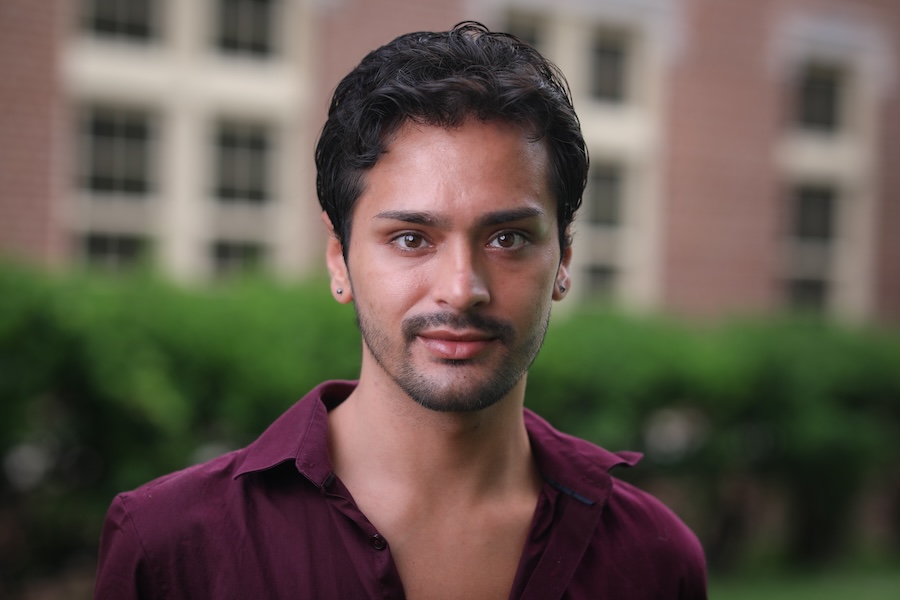FSU doctoral candidate earns prestigious Marilyn Yarbrough Dissertation/Teaching Fellowship

A Florida State University student has earned the Marilyn Yarbrough Dissertation/Teaching Fellowship from Kenyon College to complete his doctoral program and gain teaching experience in a small liberal arts college setting.
In July, Tim Lomeli, a doctoral student pursuing French and Francophone studies through the Department of Modern Languages and Linguistics, will use the fellowship to spend the final year of his doctoral program at Kenyon College in Gambier, Ohio, finishing his dissertation, titled “Community, Identity, and Vodou: Reconsidering Haitian Identity through the Novels of Kettly Mars.”
“Leaving FSU for my last year is bittersweet,” Lomeli said. “I am excited to live and teach in a different academic environment. This fellowship will grow my teaching skills and challenge me to leave my comfort zone.”
The Marilyn Yarbrough Dissertation/Teaching Fellowship is a one-year program offered by Kenyon College to doctoral students in all fields who need only to finish their dissertations to complete their degree. Fellows receive a $39,498 stipend plus health benefits, housing, and a small moving allowance in addition to supplemental funding for research, travel to conferences and professional expenses. The fellowship, named for the late legal scholar Marilyn Yarbrough who served as editor of the Black Law Journal and on the Pulitzer Prize Board, aims to encourage scholars from underrepresented backgrounds to consider teaching at small liberal arts colleges after graduation. Previous recipients have hailed from the University of Miami, Duke University, Johns Hopkins University, Stanford University and Yale University, among others.
“Selective and prestigious graduate fellowships like these are a true recognition of the academic potential of young scholars like Tim as well as a testament to the quality and job market promise of FSU’s French program,” said Reinier Leushuis, chair of the Department of Modern Languages and Linguistics.
Lomeli’s dissertation explores the representation of Haitian Vodou in the works of Kettly Mars, a Haitian poet and novelist. Mars’ work is written in French, and since Haiti was a French colony, the language is still spoken by many. While often mistaken for Louisianan Voodoo, Haitian Vodou is an African diasporic religion that fundamentally views living beings as spirits inhabiting the visible world and extends beyond religion to include philosophy, medicine and justice. Vodou is widely practiced in Haiti and includes practices of kinship, where people form familial-like bonds based on shared beliefs instead of blood.
In his dissertation, Lomeli explains how Mars’ work portrays Vodou as a living, evolving spirituality that adapts to the needs and lives of Haitians in ways imported religions do not.
“Engaging with media such as novels, TV, or music gives us knowledge about the human condition, which builds empathy for people who have lived completely different experiences than our own,” Lomeli said. “Because of the stereotypes and representations of Vodou that dominate U.S. media, which are disseminated worldwide, people do not understand Vodou, which can be incredibly damaging and have tangible effects on the Haitian population.”
During Lomeli’s fellowship year, he will teach one course — developed from his dissertation — each semester.
“Boiling down your dissertation is a real challenge, so these courses will allow me to reflect on how to effectively teach my research,” Lomeli said. “Furthermore, I will be able to constantly learn from students, gaining new perspectives that can oftentimes only come from fresh eyes.”
As the youngest of three children in a Mexican-American family, Lomeli’s passion for French studies began in middle school when he chose to study French to be different from his older sisters, who both studied Spanish.
He holds a bachelor’s in psychology and French from the University of Wisconsin-La Crosse, a master’s in language, literature, and translation from the University of Wisconsin-Milwaukee, and a master’s in French studies from Indiana University Bloomington.
Lomeli chose FSU for his doctoral studies because of the Winthrop-King Institute for Contemporary French and Francophone Studies, which advances U.S. knowledge of France and the French-speaking world and promotes interdisciplinary work encouraging new understandings of France and its relationship to the world, particularly in relation to former French colonies.
“The French faculty are incredible, and the Winthrop-King Institute shines through by providing unique student resources and opportunities,” Lomeli said. “Very few other places are as active and engaged with Caribbean creators and intellectuals as FSU.”
To learn more about FSU’s Department of Modern Languages and Linguistics, visit modlang.fsu.edu. For more information on the Winthrop-King Institute, visit winthropking.fsu.edu.
